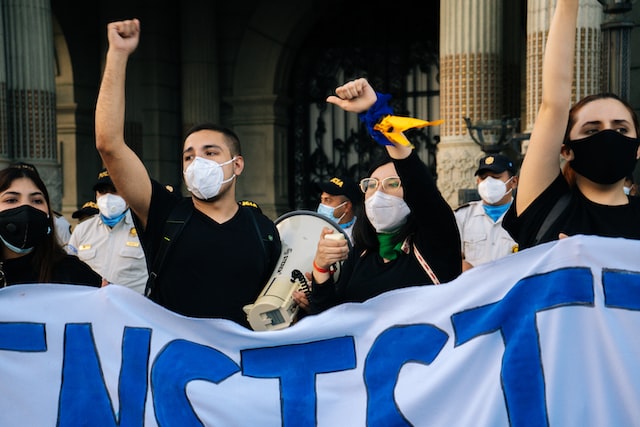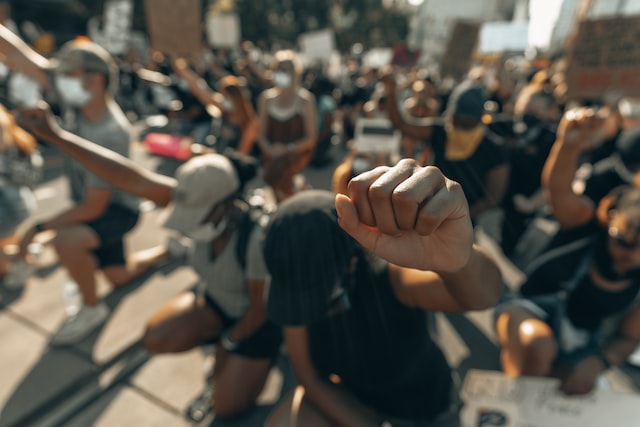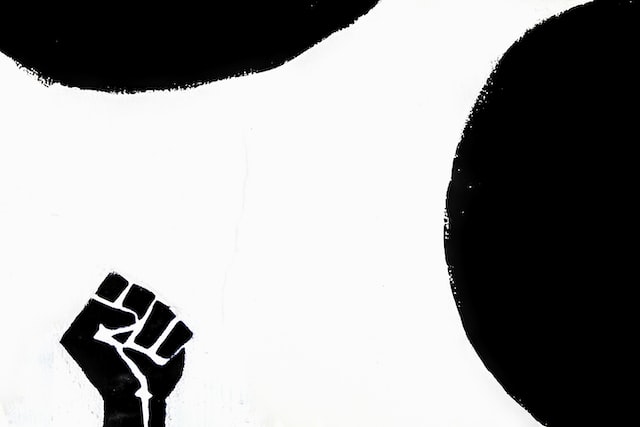Rebellion can be seen as an act of protest against a particular system or order whereas revolution is a more powerful form of resistance aimed at overthrowing existing structures and replacing them with new ones.
Rebellion
(Photo by Shalom de León on Unsplash )

While rebellion and revolution both involve an uprising against an authority, there is a key difference between the two terms. Rebellion is generally used to describe an internal uprising against a government or other authority, while revolution typically refers to an external effort to overthrow a regime.
In other words, rebellion is typically used to describe uprisings that take place within a country or other entity, while revolution often describes uprisings that occur across multiple countries or regions. Additionally, rebellion usually implies that the aim of the uprising is to change specific policies or practices within the government or authority, while revolution implies that the goal of the uprising is to replace the existing government or regime entirely.
Revolution
(Photo by Clay Banks on Unsplash )

A revolution is a dramatic and often violent change in the political, social, or economic order of a society. It involves a fundamental shift in the way a society is organized and operates, often resulting in the overthrow of an existing government or ruling power.
Revolutions can be driven by a variety of factors, including political oppression, economic hardship, social inequality, and cultural or religious differences. They can take many different forms, from peaceful protests and civil disobedience to armed uprisings and violent conflicts.
The outcome of a revolution can be unpredictable, and it may result in significant social and political changes, including the establishment of a new government, a change in the balance of power, or the creation of new social structures and institutions. Successful revolutions often require the support and participation of a significant portion of the population, as well as effective leadership and organization.
What is the difference between rebellion and revolution?
Rebellion and revolution are related concepts that both involve a challenge to an established order, but they differ in their scope, goals, and methods.
A rebellion is typically a smaller and more localized uprising against a particular authority or government. It often involves a group of people who are dissatisfied with their current situation and seek to challenge the established order through protests, demonstrations, or other forms of resistance. A rebellion may seek limited changes in the existing order, such as the removal of a particular leader or the redress of specific grievances.
A revolution, on the other hand, is a more far-reaching and comprehensive challenge to the established order. It seeks to fundamentally transform the existing political, social, or economic system and often involves a large-scale uprising or armed conflict. A revolution aims to create a new system or order that is fundamentally different from the previous one, often with the goal of addressing deep-seated societal problems or injustices.
While rebellions may be more spontaneous and less organized, revolutions are often more planned and strategic, with clear goals and objectives. They may require significant support and participation from various segments of society and may involve the establishment of new political structures and institutions.
Overall, while rebellion and revolution are related concepts, the primary difference between them lies in their scope and goals. Rebellion seeks limited change within the existing system, while revolution seeks to create a new system altogether.
The Pros and Cons of Rebellion and Revolution
Rebellion and revolution are complex and often controversial means of challenging established power structures and advocating for change. Here are some potential pros and cons of rebellion and revolution:
Pros of Rebellion:
- Can draw attention to specific grievances and injustices
- Can inspire others to speak out against oppression and join the movement
- Can encourage governments and authorities to address the underlying issues and work towards positive change
- Can promote a sense of empowerment and solidarity among those who feel marginalized or oppressed
Cons of Rebellion:
- Can lead to violence and destruction of property
- Can harm innocent bystanders and lead to loss of life
- May be ineffective in bringing about lasting change
- May lead to increased repression and crackdowns by authorities
Pros of Revolution:
- Can fundamentally transform the existing political, social, or economic system
- Can create a more just and equitable society
- Can provide opportunities for marginalized groups to gain power and influence
- Can inspire similar movements and changes in other parts of the world
Cons of Revolution:
- Can be violent and result in significant loss of life and destruction of property
- May lead to political instability and uncertainty
- May result in the loss of established institutions and traditions, which can be both positive and negative
- May not achieve its intended goals and result in new forms of oppression and inequality.
Overall, the decision to engage in rebellion or revolution should be carefully considered, and non-violent means of resistance and reform should be pursued whenever possible. It is also important to weigh the potential benefits and risks of these methods and to consider their potential impact on both individuals and society as a whole.
What are the types of rebellions?
There are two types of rebellions: Violent and Nonviolent.
Violent rebellions are characterized by the use of force to achieve their goals. This can include armed conflict, terrorism, and other forms of violence.
Nonviolent rebellions, on the other hand, seek to achieve their goals without resorting to violence. Instead, they may use tactics such as civil disobedience, economic pressure, and social mobilization.
What are some famous revolutions in history?
There have been many famous revolutions throughout history that have had significant impacts on society, politics, and culture. Here are some examples:
- The American Revolution (1775-1783): This revolution was a political upheaval that resulted in the independence of the Thirteen Colonies from British rule and the formation of the United States of America.
- The French Revolution (1789-1799): This revolution was a period of political and social upheaval in France that resulted in the overthrow of the monarchy and the establishment of the First French Republic.
- The Haitian Revolution (1791-1804): This revolution was a successful slave revolt that resulted in the establishment of the independent nation of Haiti, the first independent black-led nation in the world.
- The Russian Revolution (1917-1923): This revolution was a series of political and social upheavals that led to the overthrow of the Russian monarchy and the establishment of the Soviet Union.
- The Chinese Revolution (1945-1949): This revolution was a series of political and military campaigns that resulted in the establishment of the People’s Republic of China under the leadership of Mao Zedong.
- The Iranian Revolution (1979): This revolution was a series of protests and political upheavals that resulted in the overthrow of the Shah of Iran and the establishment of the Islamic Republic of Iran under the leadership of Ayatollah Khomeini.
- The Arab Spring (2010-2012): This was a series of protests and revolutions that occurred across several countries in the Middle East and North Africa, resulting in the overthrow of several authoritarian regimes.
These are just a few examples of the many revolutions that have occurred throughout history. Each of these events had unique causes, contexts, and impacts on society, and their legacies continue to shape the world today.
What is the main difference between rebellion and resistance?
Rebellion and resistance are similar in that they both involve opposition to established power structures or systems. However, there are some key differences between the two:
Goals: Rebellion is typically aimed at overthrowing or replacing an existing authority or system, whereas resistance is more focused on opposing specific policies or practices within that system.
Tactics: Rebellion often involves more extreme tactics, such as violence or armed conflict, while resistance tends to use more non-violent means such as protests, civil disobedience, and boycotts.
Scope: Rebellion is generally more sweeping in its scope, seeking to fundamentally transform the entire system, while resistance may be more narrow in its focus, targeting specific policies or practices without seeking to completely overthrow the system.
Leadership: Rebellion is often associated with charismatic leaders who are seen as leading the charge against the established authority or system, while resistance can be more decentralized and leaderless, with different groups and individuals taking up the cause in their own way.
The main difference between rebellion and resistance is one of scale and scope. Rebellion seeks to upend the entire system, while resistance focuses on specific issues or policies within that system. Both can be important tools for challenging established power structures and advocating for change, but they require different strategies and tactics.
What are the main causes of rebellion?
The causes of rebellion are complex and multifaceted, and they can vary depending on the context and historical period in question. Here are some of the main factors that can contribute to rebellion:
- Political oppression: One of the most common causes of rebellion is political oppression, in which a group or population feels disenfranchised or marginalized by the ruling government or authority. This can include factors such as authoritarian rule, lack of political representation, or systemic discrimination.
- Economic inequality: Economic inequality is another common driver of rebellion, as it can create a sense of injustice and social exclusion. This can manifest in different forms, such as unequal access to resources, unemployment or underemployment, or poverty.
- Cultural or religious differences: Cultural or religious differences can also contribute to rebellion, particularly in contexts where different groups have competing visions for society or differing values and beliefs. This can lead to conflicts over issues such as language, religion, or cultural practices.
- Environmental factors: Environmental factors such as natural disasters or resource scarcity can also contribute to rebellion, particularly in societies that are heavily dependent on a particular resource or that have poor environmental management.
- External influences: External factors such as foreign intervention or economic sanctions can also contribute to rebellion, particularly if they are seen as undermining national sovereignty or causing economic hardship.
These are just a few of the main factors that can contribute to rebellion. In practice, the causes of rebellion are often complex and interrelated, and may involve a combination of political, economic, social, and cultural factors.
What are the main causes for a Revolution?
There are many different factors that can contribute to the outbreak of a revolution. In general, a revolution occurs when there is a significant change in power or governance, usually as a result of popular uprising against an oppressive regime. Here are some of the main causes for a revolution:
- Discontent with the current government or ruling class: This is often the most important factor in sparking a revolution. When people are unhappy with their leaders and feel that they are not being represented or treated fairly, they may take up arms to overthrow the existing government.
- Economic inequality: When there is a large gap between rich and poor, this can lead to unrest and eventually revolution. The poor may feel that they have nothing to lose by taking up arms against the rich, while the rich may fear losing their privileged position in society.
- Social injustice: When certain groups in society are subject to unfair treatment or discrimination, this can also lead to revolutionary action. For example, the civil rights movement in the United States was partly motivated by social injustice against African Americans.
- Political repression: When people are not allowed to voice their opinions freely or exercise their political rights, this can create frustration and anger that may boil over into open rebellion.








